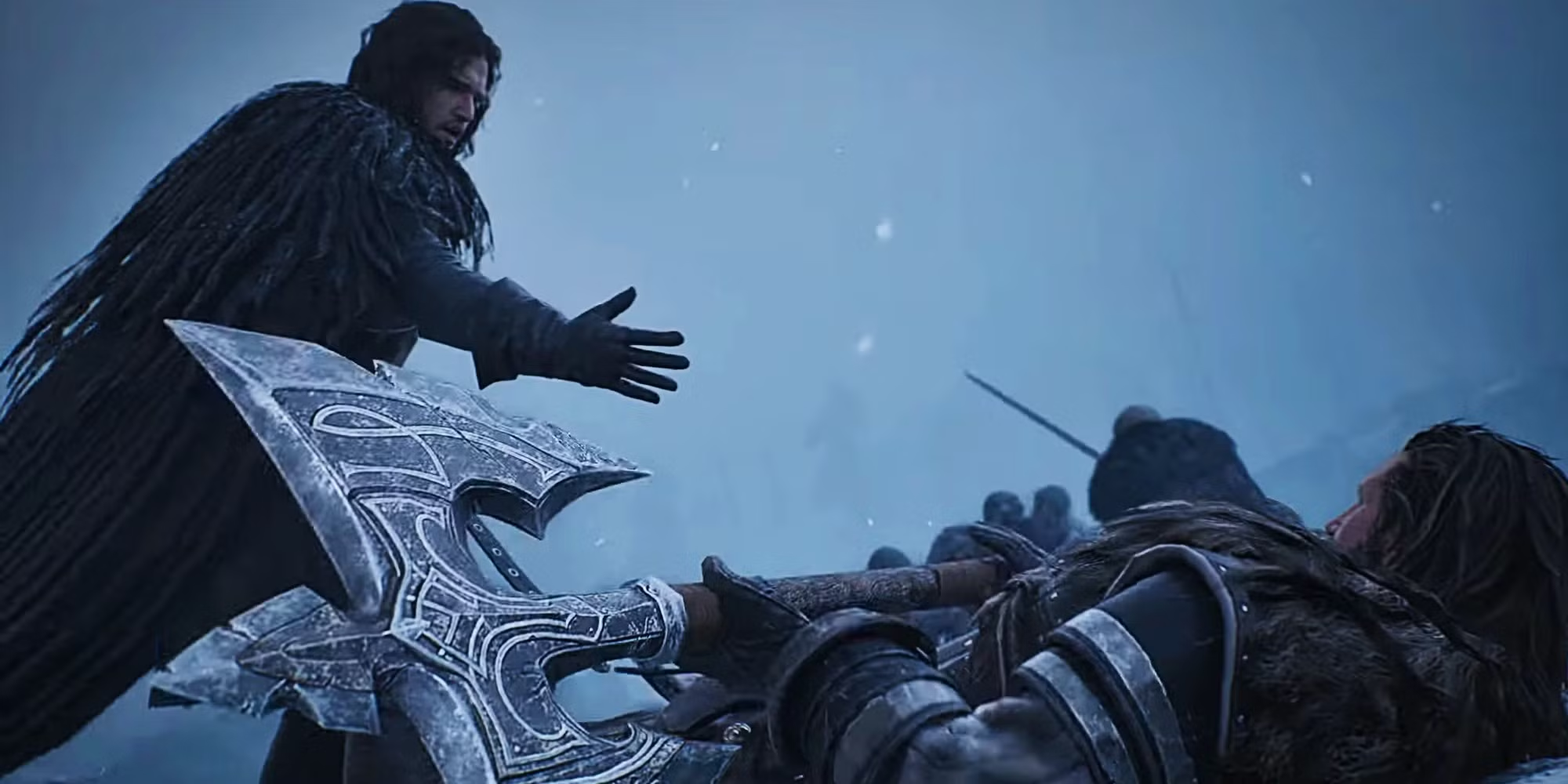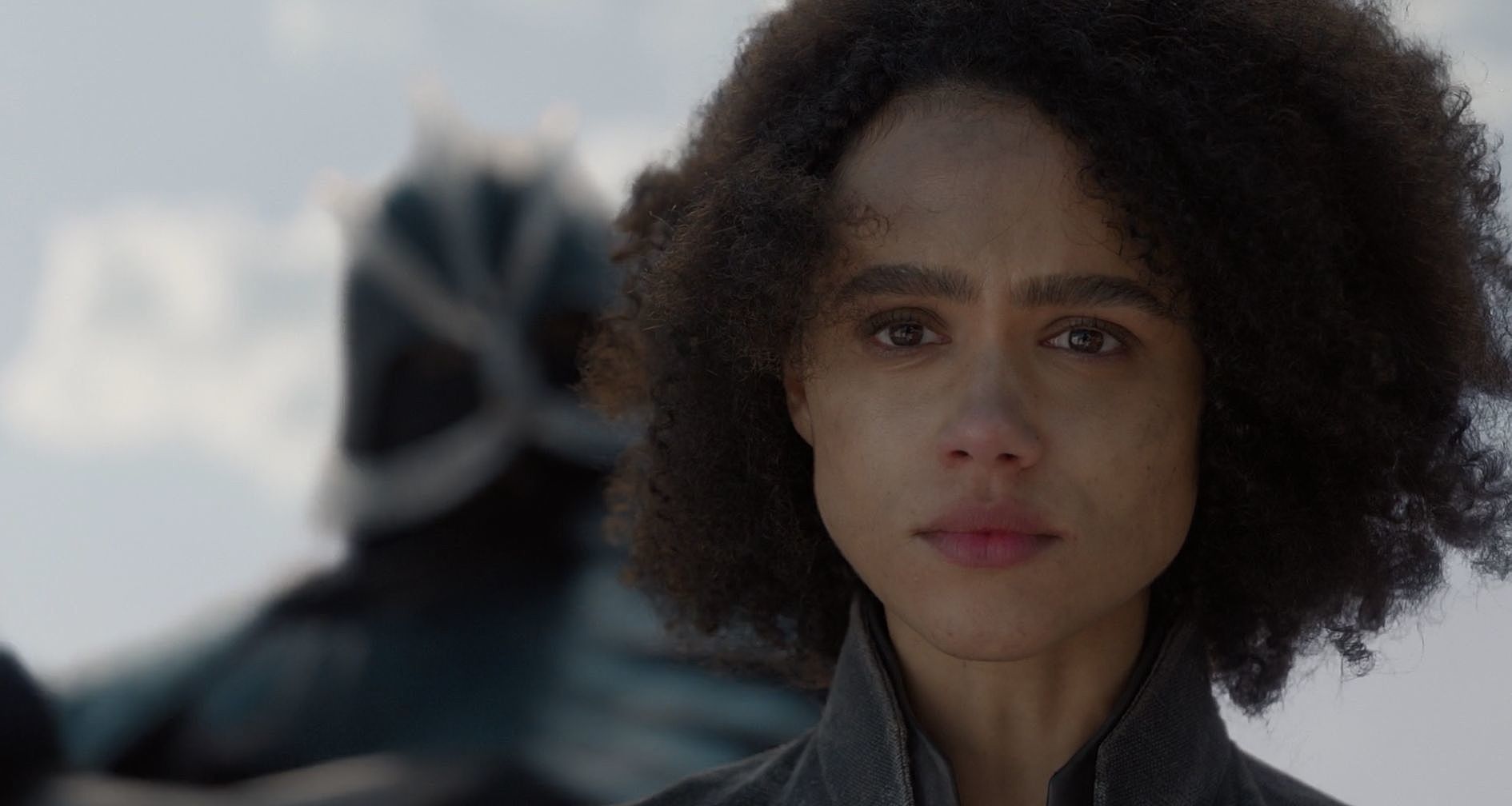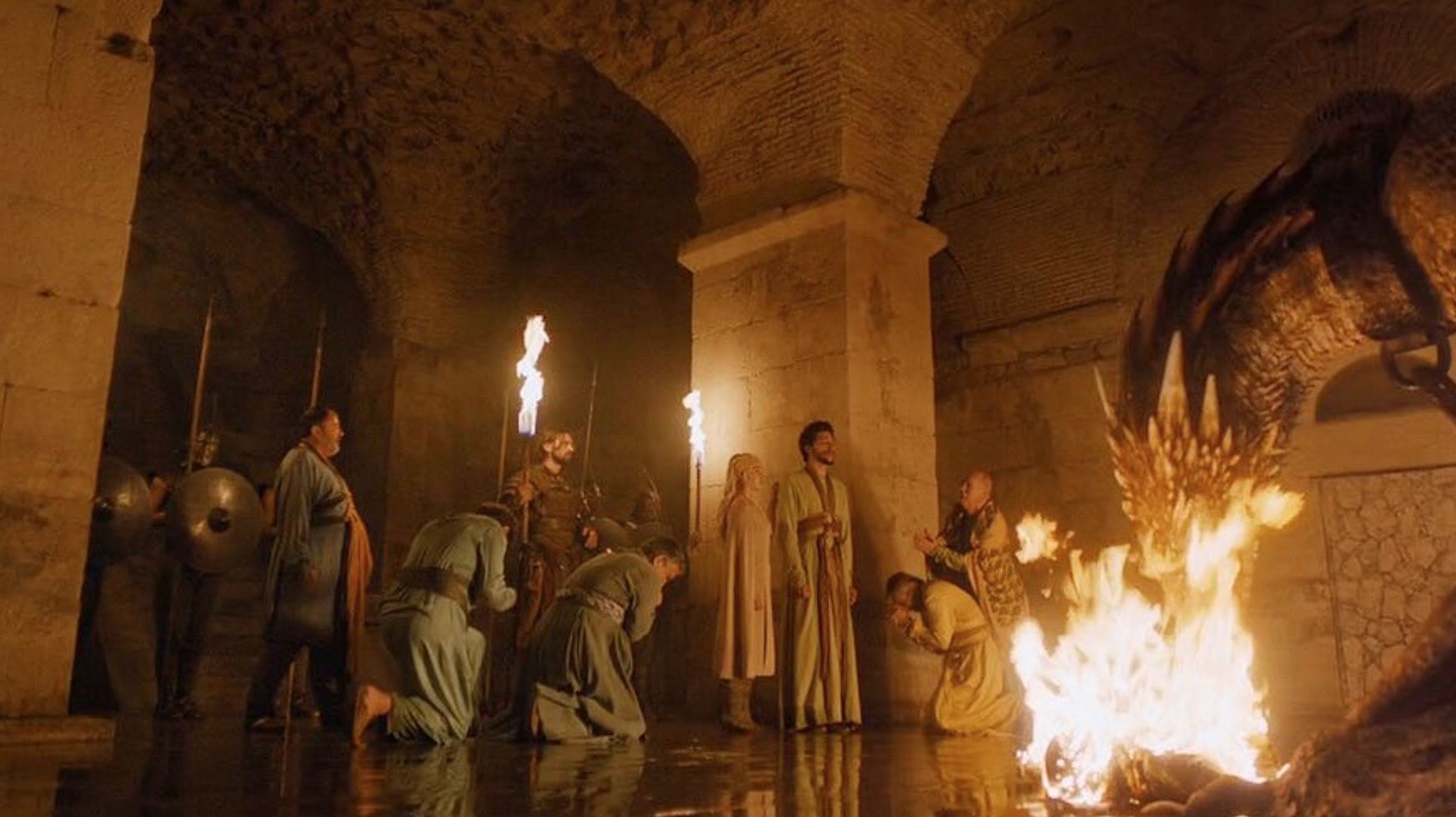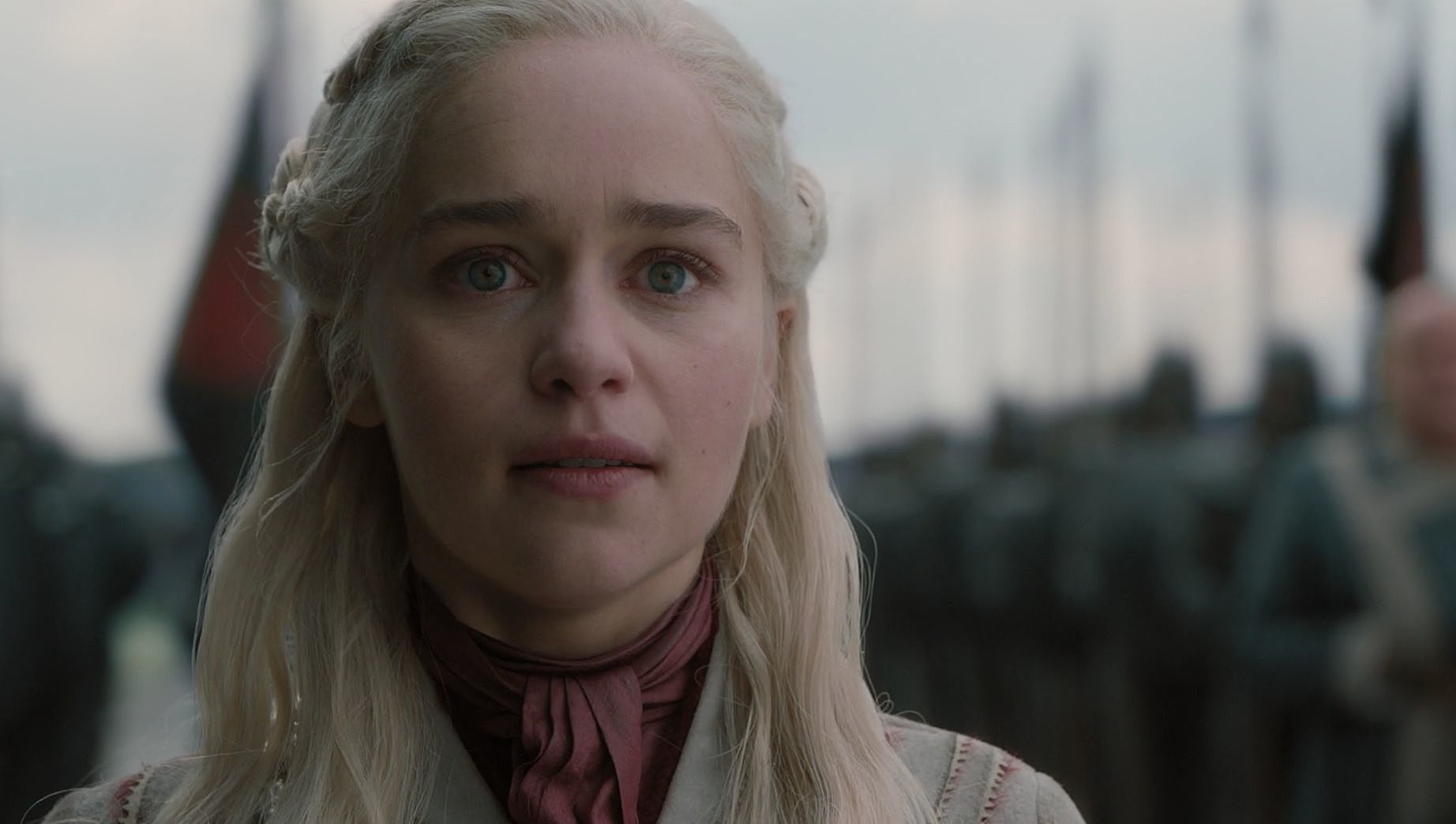The latest episode of Game of Thrones has stirred up a huge amount of controversy. Some fans are upset about Euron Greyjoy taking down Rhaegal the dragon in a way that stretched believability past the breaking point, and…yeah, I’m with you there. Some are mad that we didn’t get to see Arya and Sansa’s immediate reactions to the revelation about Jon’s secret origins and…no, I disagree on that one.
But the biggest criticisms are about Daenerys Targaryen, the Mother of Dragons, Breaker of Chains…all of that. It’s pretty clear that the show is setting her up for a turn to the dark side, so to speak, and many fans see it as an assassination of her character.
Are they right? Is the show treating Daenerys unfairly? The answer to that is harder to unpack. Let’s try.
So the story as the show has laid it out to us is this: Daenerys spent the first six seasons of the series on Essos, getting more and more powerful. Pretty early on, her end goal was to reclaim the Iron Throne that was her father’s, at least since she stepped out of the fire at the end of season 1, her dragons newly hatched. By season 2, she was making clear in no uncertain terms that she would stop at nothing to achieve her aims. “I’m no ordinary woman,” she told the Spice King of Qarth. “My dreams come true…I will take what is mine. With fire and blood, I will take it!”
Daenerys has spent the last two seasons in Westeros, where she hasn’t gotten a warm welcome. Her alliances with Dorne and the Reach fell apart pretty quickly, thanks in large part because she followed advice given to her by Tyrion Lannister, her Hand. It wasn’t all his fault — Jaime was clever in abandoning Casterly Rock and sacking Highgarden — but Tyrion hasn’t exactly been batting 1000 lately.
Worth noting is that Tyrion’s advice to Daenerys generally involved ignoring her instincts and not directly killing her enemies where they slept; instead, he wanted her to win other houses to her side until the people of King’s Landing overthrew Cersei for her. This is in opposition to what the Lady Olenna Tyrell told her: “You’re a dragon. Be a dragon.” Had Daenerys followed this counsel, she probably would have torched the Red Keep long ago. Had that happened, it’s possible many of her current problems could have been avoided.
In any case, things got worse when Dany got to the North, where people were either very wary of or downright hostile to her. In particular, Sansa Stark has been resistant to Dany’s rule, and given that she’s in a position of power at the right hand of Jon Snow, that’s a problem.
Then, a large chunk of her Dothraki and Unsullied soldiers died fighting against the dead at Winterfell, not to mention her most trusted counselor Jorah Mormont, who had been with her since her humble beginnings as Khal Drogo’s prize bride. On top of that, she’s just learned that the man with whom she is in love, Jon Snow, A) is actually her nephew, and B) has a better claim to the Iron Throne than her. She rushes south, probably hoping for a win after a few long months, only for the vile Euron Greyjoy to shoot one of her dragons — her children — out of the sky, and to take her friend and longtime confidante Missandei prisoner. Outside the walls of King’s Landing, Cersei Lannister executes Missandei in front of her.
So what we’re supposed to believe is that all of this combined is enough to get Dany to a place where she’s willing to take the Iron Throne by violent means and in possible disregard for the civilians Cersei has gathered in the Red Keep. As she puts it when talking about Cersei, “They should know who to blame when the sky falls upon them.” The question is whether this is a natural progression of what has come before.
In many ways, the show has been setting this up for a very long time. She is willing to take extreme measures when she feels they are warranted. Missandei’s final word to her queen, “Dracarys,” is a callback to when they first met in Astapor, when Daenerys commanded her newly acquired Unsullied army to “slay the Masters, slay the soldiers, slay every man who holds a whip.” And they did. By saying “Dracarys,” Missandei may be saying that King’s Landing is as bad as Astapor, as corrupt, and as in need of a good purge. And with Cersei as their leader, we can’t say she’s completely off base.
Then there’s the time Daenerys took Meereen and nailed 163 of the Great Masters in the town square, as justice for them doing the same to 163 slave children they killed and left along her road to the city.
In both of these cases, Daenerys limits her violence. In Astapor, she specifically tells the Unsullied not to harm children, and in Meereen, she kills only the Great Masters. But innocents still suffer. Without the Good Masters around to keep order, Astapor slides into chaos, and eventually is ruled by a Butcher King. As for the crucifixion of the Great Masters of Meereen, we learn from Hizdahr zo Loraq that at least one of them was actually trying to prevent the killing of slave children, the crime for which Daenerys punished them all. This reminds me of what Daenerys fed a random, surviving Great Master of Meereen to two of her dragons following the death of Barristan Selmy. He may have done something or he may have done nothing, but in her wrath she was willing to make an example of him.
And there are times when she’s contemplated going farther. At the Battle in Daznak’s Pit, she says that Meereen may one day return to the dust, at her command “if need be.” Late in season 6, when she returns to the city after securing the loyalty of the Dothraki by roasting their leaders alive and stepping out of the burning temple unscathed, she tells Tyrion of her plan for the city. “I will crucify the Masters, I will set their fleets afire, kill every last one of their soldiers and return their cities to the dirt. That is my plan.” Tyrion, beginning a pattern he’s been a part of since this moment, talks her out of it.
The situation with King’s Landing is different, but these examples show that Daenerys is not afraid to use extreme force when she feels it necessary. She definitely has a strain of absolutism in her. “They have a choice,” she once said of the rulers of Slaver’s Bay. “They can live in my new world or they can die in their old one.” That’s not so different that what she tells Varys in the latest episode. “I’m here to free the world from tyrants. That is my destiny. And I will serve it no matter the cost.”
I’ve seen some fans argue that this is at odds with all the times Daenerys has displayed a gentle countenance. As Jorah told her in Qarth, she has “a gentle heart,” one we’ve seen on display many times. In Astapor, before she killed the Good Masters, she tried to give water to slaves on the Walk of Punishment. In Meereen, she locked up two of her dragons when she saw that Drogon had killed a child. Dany can be sensitive and kind, but she can also be wroth and destructive, particularly when she’s lost people close to her, as evidenced by what she did after the Sons of the Harpy killed Ser Barristan. She’s a complex character full of rich contradictions. Right now, having lost so much, her destructive side is coming to the fore, perhaps more than it has before. Just because we haven’t seen her sack a city packed with non-fighting civilians doesn’t mean she isn’t capable. We know she at least thought about it with Meereen.
Daenerys tried things Tyrion’s way and suffered. Perhaps Olenna’s advice is rattling around in her head. Also, we should note that just because she’s thinking of attacking King’s Landing directly doesn’t mean she’s going to kill civilians as Tyrion and Varys seem to fear. She could still order her armies to concentrate only on the soldiers and leaders, but we’ll have to wait until this Sunday to see how that shakes out.
So basically, I do think the show has set this development up. It has not come out of nowhere. However, it does seem to be progressing quickly. Why does it feel that way?
Part of the reason may be that when Dany was in Essos, we never got another perspective on her actions. The Masters of Astapor, Yunkai and Meereen surely do not see Daenerys Targaryen as a conquering hero — they see her as an enemy bent on destroying their way of life, someone to be feared and fought. But none of the Masters were even close to being sympathetic characters, so as audience members, their views didn’t count for much.
On the other hand, the views of characters like Tyrion, Sansa and Varys count for a great deal. We’ve gotten to know these characters as well as we’ve gotten to know Daenerys, and if they question Dany’s actions, it’s much harder to ignore. Jorah and Barristan occasionally questioned Dany’s decisions on Essos, but never too strenuously. Her point of view was prized above all others. No more. That could party account for why her fury feels different this time.
All the same, the show could do a better job of selling Daenerys’ emotional journey. I could have used a scene between Cersei and Missandei, for example, one that threw into relief just how terrible and callous a queen Cersei is. Most of all, I think we need a reminder that however adrift she’s feeling right now, Daenerys does have a gentle side. In the Song of Ice and Fire novels, Dany sometimes things of time she spent as a child living in Braavos, in a house with a red door. I think a scene of her reminiscing about that long-lost time, a time she was happy, a time before she had to decide the fate of tens of thousands of lives, would go a long way toward helping us understand where she’s coming from.
How will this all end? I don’t know, but I’m as eager as anyone to find out. I wonder if it will play better after the show is over and we have the whole story laid out before us. For now, I’d like to go into these final two episodes appreciating Daenerys Targaryen for all she is and done, both the good and the bad, whatever those terms mean to you.
To stay up to date on everything Game of Thrones, follow our all-encompassing Facebook page and sign up for our exclusive newsletter.
Watch Game of Thrones for FREE with a no-risk, 7-day free trial of Amazon Channels




















![[Book Review] The Blade Itself (The First Law Trilogy) by Joe Abercrombie](https://bendthekneegot.com/wp-content/uploads/2018/01/1516047103_maxresdefault-218x150.jpg)





















